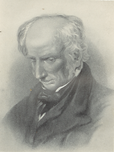Love Lies Bleeding
by William Wordsworth
You call it, Love lies bleeding,
-- so you may,
Though the red Flower, not prostrate, only droops,
As we have seen it here from day to day,
From month to month, life passing not away:
A flower how rich in sadness! Even thus stoops,
(Sentient by Grecian sculpture's marvellous power)
Thus leans, with hanging brow and body bent
Earthward in uncomplaining languishment
The dying Gladiator. So, sad Flower!
('T is Fancy guides me willing to be led,
Though by a slender thread,)
So drooped Adonis bathed in sanguine dew
Of his death-wound, when he from innocent air
The gentlest breath of resignation drew;
While Venus in a passion of despair
Rent, weeping over him, her golden hair
Spangled with drops of that celestial shower.
She suffered, as Immortals sometimes do;
But pangs more lasting far, that Lover knew
Who first, weighed down by scorn, in some lone bower
Did press this semblance of unpitied smart
Into the service of his constant heart,
His own dejection, downcast Flower! could share
With thine, and gave the mournful name which thou wilt ever bear.
Notes to the poem:
Written and first published in 1845.
It has been said that the English, though their country has produced so many great poets, is now the most unpoetical nation in Europe. It is probably true; for they have more temptation to become so than any other European people. Trade, commerce, and manufactures, physical science, and mechanic arts, out of which so much wealth has arisen, have made our countrymen infinitely less sensible to movements of imagination and fancy than were our forefathers in their simple state of society. How touching and beautiful were, in most instances, the names they gave to our indigenous flowers, or any other they were familiarly acquainted with! -- Every month for many years have we been importing plants and flowers from all quarters of the globe, many of which are spread through our gardens, and some, perhaps, likely to be met with on the few Commons which we have left. Will their botanical names ever be displaced by plain English appellations, which will bring them home to our hearts by connection with our joys and sorrows? It can never be, unless society treads back her steps towards those simplicities which have been banished by the undue influence of towns spreading and spreading in every direction, so that city-life with every generation takes more and more the lead of rural. Among the ancients, villages were reckoned the seats of barbarism. Refinement, for the most part false, increases the desire to accumulate wealth; and while theories of political economy are boastfully pleading for the practice, inhumanity pervades all our dealings in buying and selling. This selfishness wars against disinterested imagination in all directions, and, evils coming round in a circle, barbarism spreads in every quarter of our island. Oh for the reign of justice, and then the humblest man among us would have more power and dignity in and about him than the highest have now!
Source:
The Complete Poetical Works of William WordsworthCopyright 1888
Thomas Y. Crowell & Co., New York
